Frosted Guava Auto Cannabis Strain Week-by-Week Guide
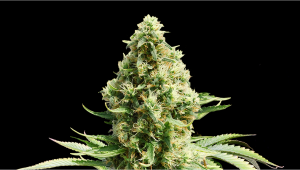
- 1. Grow specifications
- 2. Grow set up
- 3. Germination and seedling stage | week 1
- 4. Early veg | week 2
- 5. Mid veg | weeks 3-4
- 6. Transition (pre-flower) | week 5
- 7. Early flower | weeks 6-7
- 8. Mid flower (bulk phase) | weeks 8-9
- 9. Ripening and harvest | week 10 (and beyond)
- 10. Smoke and terpene profile
- 11. In conclusion
With Frosted Guava Auto, you get a chance to experience an autoflowering version of the beloved indica sensation, Guava, that was bred with Frosted Skywalker and then crossed with XL Auto to achieve outstanding growth characteristics. This strain is a dream come to true for growers seeking a quick and rewarding cultivation experience. Bursting with dense buds covered in a glistening layer of potent THC resin, Frosted Guava Auto promises a bountiful yield and an excellent quality of the smoke. For smokers, this strain offers an intoxicating puff that delivers a strong physical and dreamy relaxed effect, sure to leave you feeling jubilantly grateful.
Though the genetics is easy to grow, it never hurts coming prepared, and we hope our Frosted Guava Auto week-by-week guide will help you get an insight into the plant’s life cycle, timeline, and its growth patterns from seed to harvest
1. Grow Specifications
As a grower, you’ll be thrilled to cultivate this beauty, as its balanced Sativa/Indica composition brings out the best of both worlds. As you nurture Frosted Guava Auto, you'll appreciate its manageable size and height, making it a great choice for indoor growers. Witness the magic unfold in just 65-70 days from seed to harvest, reaping up to 650 grams per square meter indoors and an impressive 150 grams per plant outdoors.
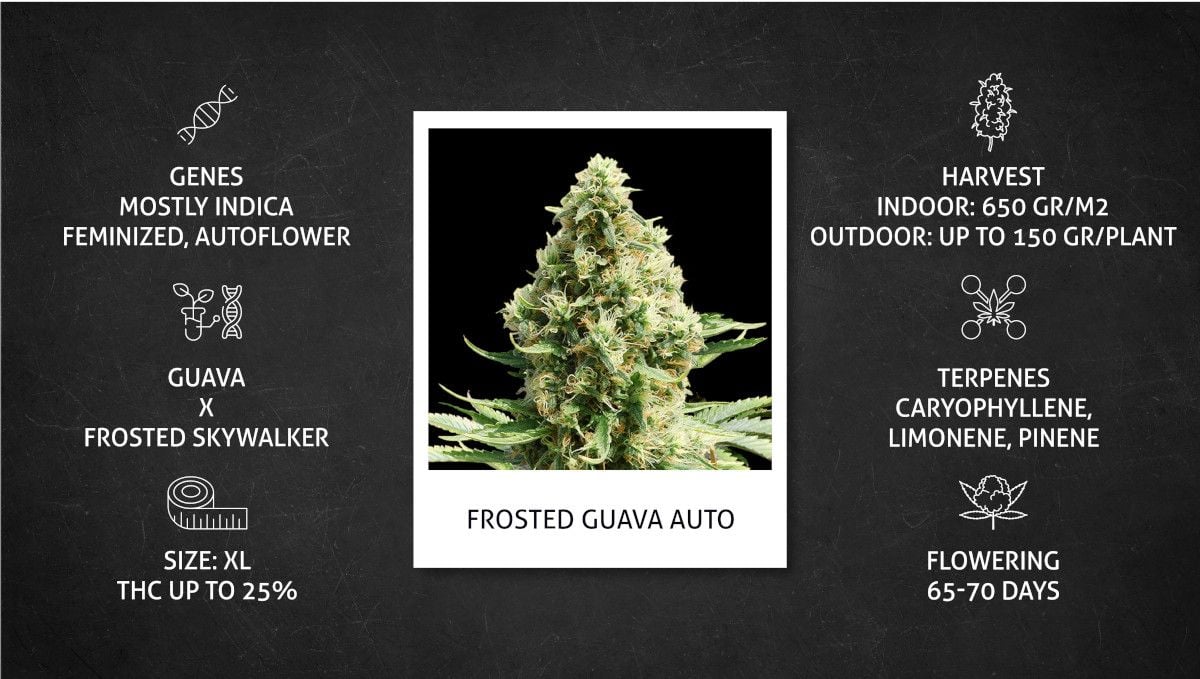
With an impressive THC percentage of 25%, the buds are laden with a sheen of trichomes, tantalizing growers with the promise of a potent harvest. The dominant terpene, Caryophyllene, along with Limonene and Pinene, infuses the smoke with a fruity taste that is sure to enchant even the most discerning connoisseur.
2. Grow Set Up
For a strain of such quality, it’s a pity we could only find two grow journals online that could serve as a source of info about Frosted Guava Auto cultivation. One of these grows was more informative and served as a backbone for our growing guide. And below, you can find the most important features of the setup and other cultivation detail.
| Grow Space: | 1.49 m2 (16 ft2) | Pot Size: | 11.36 l (3 gal) |
|---|---|---|---|
| Seed to Harvest: | 11 weeks | Medium: | Soil |
| Flowering: | 8 weeks | Nutrients: | Synthetic |
| Light Cycle: | 18/6 | pH Levels: | 6.3 |
| Light Type: | LED | Day Temperature: | 32°C (90°F) |
| Watts Used: | 300 | Humidity: | 50% |
We also occasionaly used the pics from the other grow, and comparing these two attempts, we can say that Frosted Guava Auto is a reliable cultivar and a dependable producer. You can safely pick this variety in a seed store and count on a bumper harvest.
3. Germination And Seedling Stage | Week 1
Understanding environmental conditions for cultivating a cannabis plant is important during any stage of its development, but especially in the germination and seedling stage when the young one is still vulnerable. The day temperatures should be mild, something that is comfortable for a human, and during the night, your young plant should experience a slight decrease in temperature, around 5° lower. Additionally, the relative humidity should stay rather high (optimal at 70-80%) because this decreases evaporation and lowers the risk of your seedling wilting.
| Plant Height: | 8 cm | Day Temp: | 32°C (90°F) |
|---|---|---|---|
| Distance to Light: | 66 cm | Night Temp: | 27°C (80°F) |
| pH: | 6.3 | Humidity: | 50% |
You can read our article on cannabis seed germination if you want to learn about different methods of sprouting your weed seeds. When your seed has shown a taproot or, better yet, the taproot has grown to about 1 cm (half an inch), you can put the bean into the growing medium of your choice. With autoflowers, the safest approach is to plant them directly into the final container to avoid all the dangers associated with transplanting. However, this may present some issues with watering, as it's very difficult to calculate the right amount of water in a container that is oversized for your seedling.

Please keep in mind that weed plants like their medium to be light and airy so that the roots have enough oxygen to breathe even when the medium is fully saturated (right after watering). For this, soil and coco are amended with perlite and vermiculite. If you're a soil grower, watering should be your only concern now as the young plant doesn't require any extra nutrients yet – those that have been in the soil all along are enough for the first couple of weeks. Of course, in hydroponic setups and coco coir, extra nutrients will be needed from day one.
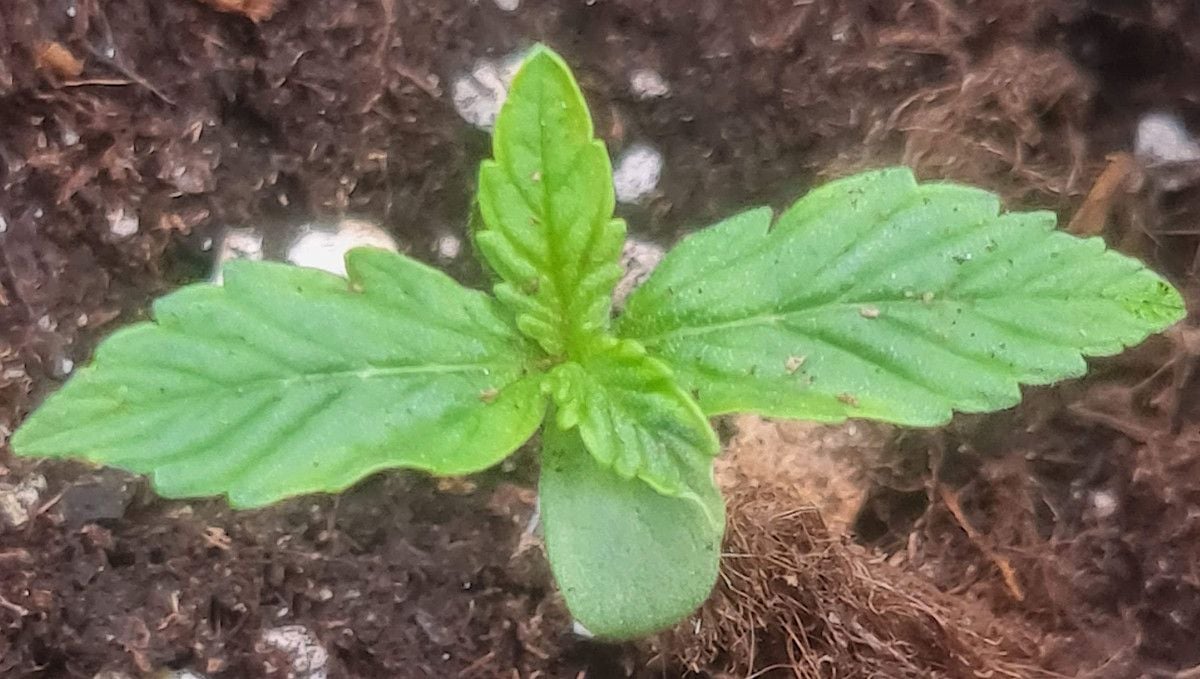
You should also pay attention to the amount of light your cannabis receives. Although it's true that our favorite plant likes a lot of light, don't go overboard with it either. In the first week, the seedling can stretch to something like 7-8 cm (about 3 inches), and that's normal. If it stays shorter, it might be receiving too much light. On the other hand, if it stretches more, the light is probably too weak or positioned too far away.
4. Early Veg | Week 2
In the second week from seed, we recommend keeping the conditions as mild as before. However, the relative humidity may not need to be as high as 70-80%. At this point, your seedling is strong enough to thrive with something like 60-70% humidity. When watering your plants, also keep in mind the pH levels. For soil grows, they should be between 6.0-6.5, while in hydro, the optimal range is 5.5-6.0.
| Plant Height: | 15 cm | Day Temp: | 32°C (90°F) |
|---|---|---|---|
| Distance to Light: | 66 cm | Night Temp: | 27°C (80°F) |
| pH: | 6.3 | Humidity: | 50% |
While the progress of your plant in the previous week may have seemed too slow to you, now you'll start noticing small changes every day. It means that your plant has developed quite an extensive root structure and is now focusing more on the above-ground part, growing new fan leaves and even side branches, at least in the bushier autoflowers.
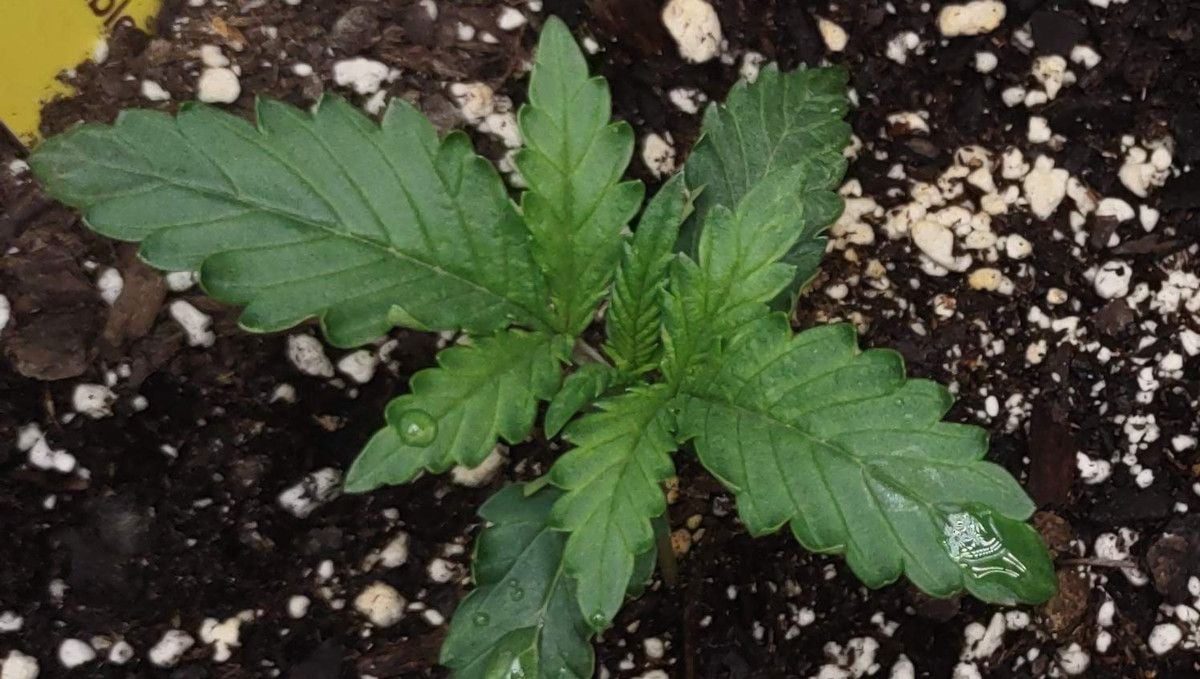
Some gardeners choose this period to start low-stress training their plants. However, in the two grow diaries that we have seen, the Frosted Guava Auto turned out to be a very compact plant. This probably means that it doesn't really need any training to stay short and compact, making it suitable even for a smaller indoor setup.
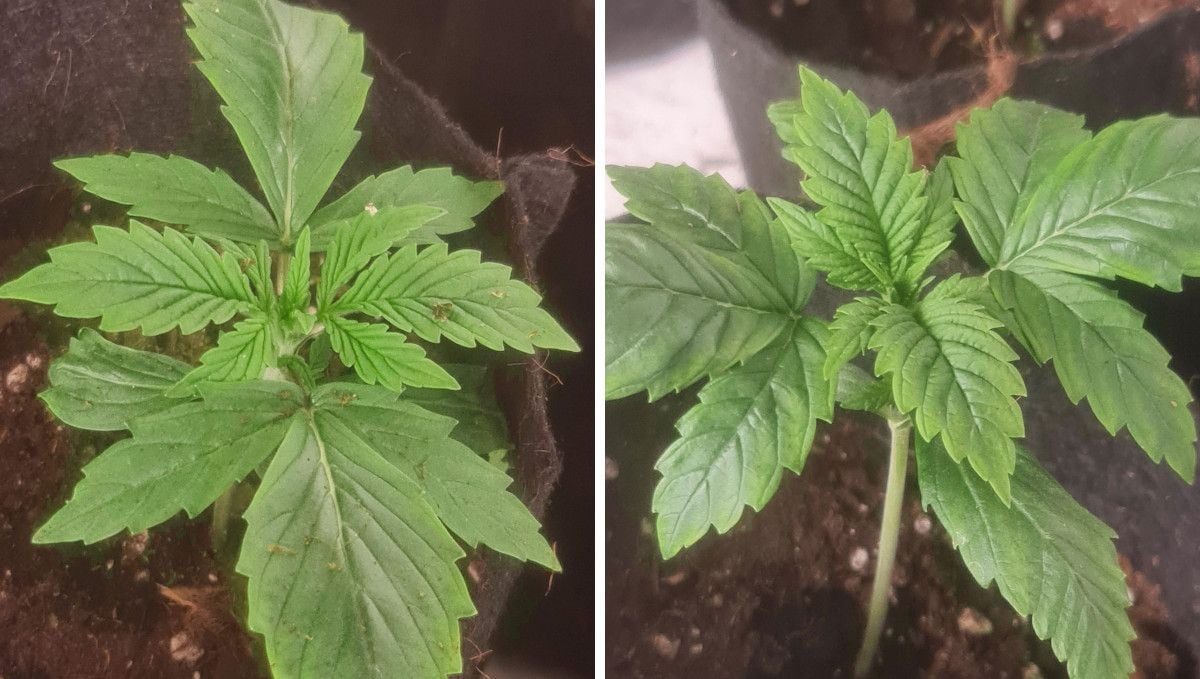
Many soil growers begin to feed their plants with extra nutrients in the second week to boost growth. However, it isn't strictly necessary yet, especially if your pot is big enough. Extra feeding will become a must in the next period when the plants will begin their rapid development called vegetative growth.
5. Mid Veg | Weeks 3-4
Congratulations! If your weed plant has come this far, it means it's a grown-up now, and it can tolerate a much wider range of conditions than ever before. This means that you don't have to be as careful in providing optimal temperature and humidity. Now you can focus on other aspects of cultivation.
| Plant Height: | 23 cm | Day Temp: | 32°C (90°F) |
|---|---|---|---|
| Distance to Light: | 66 cm | Night Temp: | 27°C (80°F) |
| pH: | 6.3 | Humidity: | 50% |
This is the vegetative phase – the period of the most rapid growth when the young plant changes overnight, and you're sometimes overwhelmed with new growth that threatens to overgrow the available space. Besides the great number of fan leaves, you will get many side branches, and you can further boost their development with training techniques such as LST.
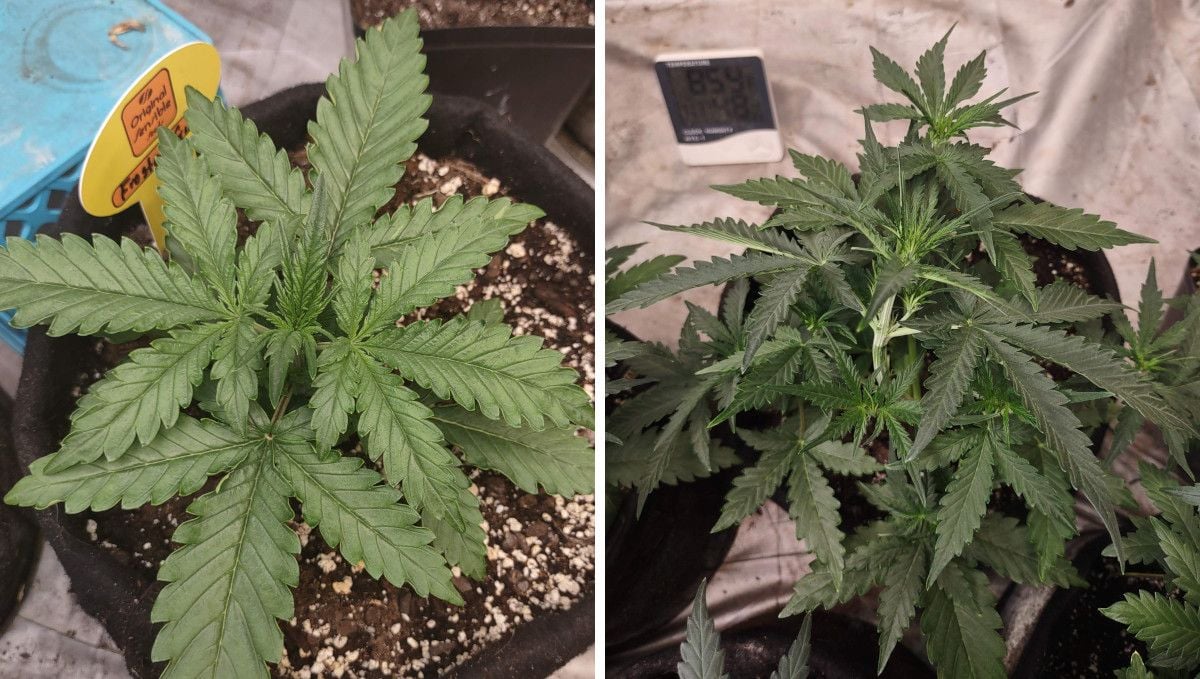
While canopy management may be important, feeding your plants is of much more significance now. The appetite of your plants for nitrogen is now reaching the maximum as this macronutrient is needed in huge quantities for the growth of leaves and branches. Phosphorus and potassium, on the other hand, are of lesser importance at this stage; these two will come center stage later, during flowering.
6. Transition (Pre-Flower) | Week 5
You'll probably get away with keeping the same conditions for your weed plant from seed to harvest. However, it's best to adapt them to the stage that you are currently in. The closer you are to flowering, the lower the temperature can be. As for the relative humidity, it should gradually get closer to the lower end of the optimal range of 40-60% as your plant matures.
| Plant Height: | 23 cm | Day Temp: | 32°C (90°F) |
|---|---|---|---|
| Distance to Light: | 66 cm | Night Temp: | 27°C (80°F) |
| pH: | 6.3 | Humidity: | 50% |
You may miss the first signs of flowering being underway as the first pistils (tiny white hairs) appear in the middle nodes of the plant where it's hard to see them. However, as soon as the process moves to the tops, the changes will be unmistakable. First, you may notice the change of color on the tops as they begin to look more yellowish than before. Then, the little leaves growing on tops will become extra narrow, almost threadlike, and practically indistinguishable from the pistils. With the tops becoming fluffy like this, the flowering -- and the countdown to the harvest -- begins.

In the two grow diaries available online, we have seen that Frosted Guava Auto is a very fast plant. It enters the pre-flowering stage very early, even before week 5 in some cases, and it immediately proceeds to form its first buds.

You don't have to change the light schedule for autoflowers to make them start to bud. However, changing the nutrient schedule is a must. You can do it right now -- store away the bottle that you used before and change it to the one with less nitrogen (N) and more phosphorus and potassium in it (P and K).
7. Early Flower | Weeks 6-7
Now that flowering starts in earnest and the buds begin to stack up and bulk up, it's more important than ever to lower the day and night temperatures so that THC and other cannabinoids don't degrade too quickly, and the terpenes don't evaporate at too fast a rate. It's also high time to start worrying about the relative humidity as the buds get bigger and denser, and the risk of mold and bud rot developing inside them increases.
| Plant Height: | 53 cm | Day Temp: | 32°C (90°F) |
|---|---|---|---|
| Distance to Light: | 66 cm | Night Temp: | 27°C (80°F) |
| pH: | 6.3 | Humidity: | 50% |
Also, don't forget that about this time in the lifecycle, the branches of your plants begin to stretch and may double or even triple in length. Don't let that catch you by surprise. Be prepared, and if your grow tent doesn't have much available vertical space, train your plants for a lower profile. For a short plant like Frosted Guava Auto, the flowering stretch is rarely a problem. However, you've been warned.

The good news is that sometime during this period, the stretch will eventually stop, and the plant will channel all its energy into making the flowers fatter and denser. Below, you can see an example height chart of Frosted Guava Auto throughout its whole life cycle.
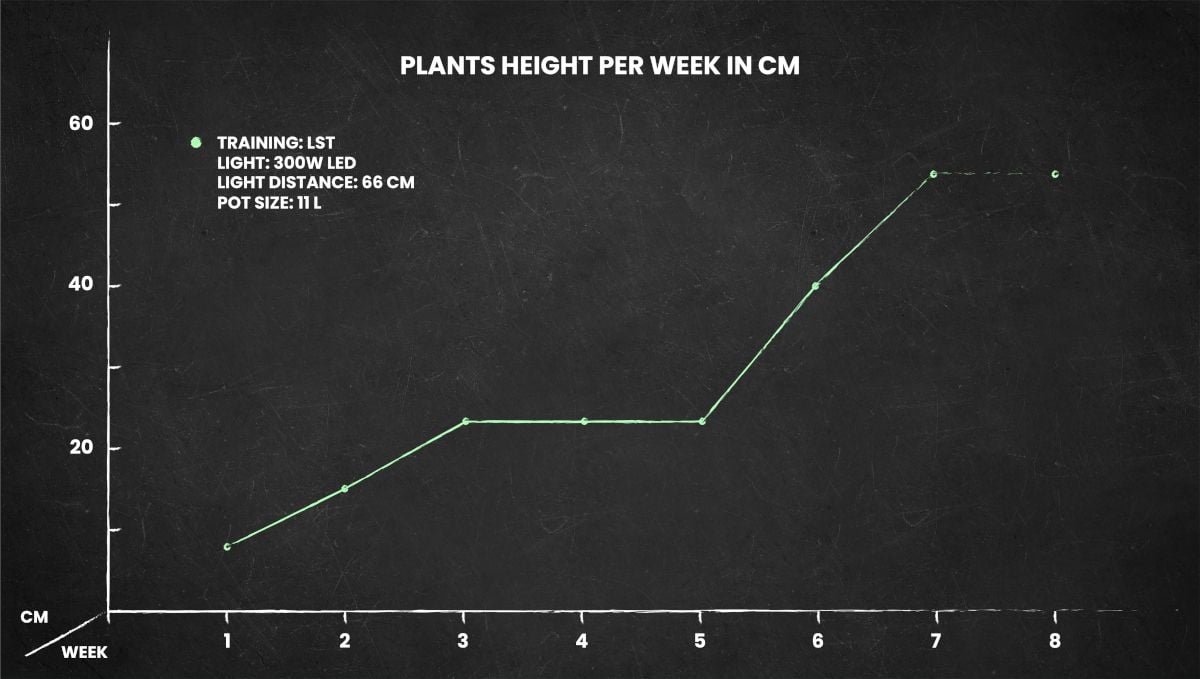
As the flowers grow in size, they also become resinous. This means that the calyces and little leaves growing next to them get covered in trichomes, tiny resin glands that store the majority of cannabinoids in the plant. Of course, you can expect that this 'frost' will emit a strong and penetrating smell. If you haven't installed a carbon filter before, now is the right time to do it.

The appetite of your autoflowers for plant food will increase now, and so will water uptake. Cannabis hates soggy soil, and in the early stages of veg and flower, it doesn't require too frequent watering, maybe only once every two or three days. However, now, you'll most probably need to water every morning or every other morning depending on the size of your pot.
8. Mid Flower (Bulk Phase) | Weeks 8-9
In the last weeks leading up to harvest, the fattening buds are the most vulnerable to fungal infections. This calls for more rigorous humidity control, which may involve selective defoliation, the use of fans, but most of all, the constant running of an extractor fan and probably a dehumidifier. Your objective here is to lower the relative humidity to about 35-40%. As for day temperatures, try to keep them around 23-25°C if you can.
| Plant Height: | 53 cm | Day Temp: | 32°C (90°F) |
|---|---|---|---|
| Distance to Light: | 66 cm | Night Temp: | 27°C (80°F) |
| pH: | 6.3 | Humidity: | 50% |
As the buds are fattening up, the plant becomes the hungriest. Now, it requires extra amounts of phosphorus and potassium, and you can provide those either with a generous amount of your staple nutrient formula or with a special PK booster. Steadily increase the amount of plant food while keeping a watchful eye on the signs of overfeeding.
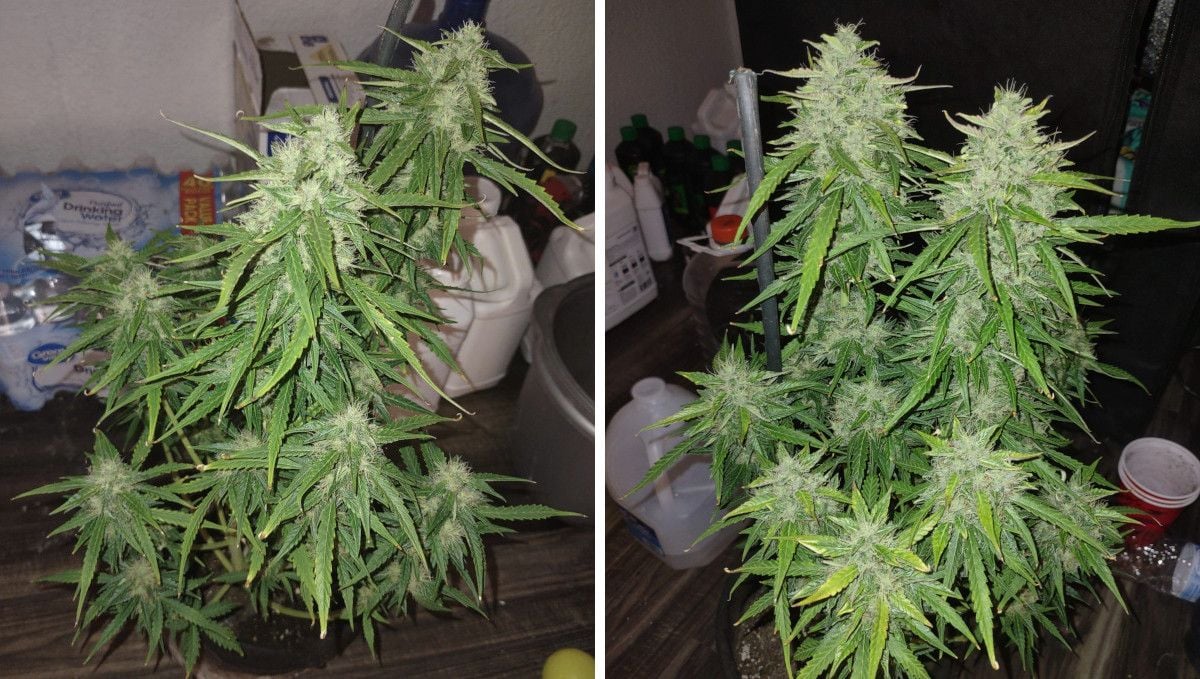
As your autoflower gets more and more mature, some of the leaves, especially those at the bottom, may yellow. Don't worry – it's normal. Just remove those yellowing leaves as they have served their purpose and now only interfere with airflow.
9. Ripening And Harvest | Week 10 (And Beyond)
It's close to harvest, and it's autumn in your grow box. This means that your plant will benefit if you lower not only the day temperature but also the night temperature to emulate the cool autumn weather. This will help conserve terpenes, THC, CBD, and other cannabinoids. However, don't be too hard on yourself if you fail to achieve an ideal environment – cannabis is surprisingly hardy and can perform quite well in a wide range of conditions.
| Plant Height: | 53 cm | Day Temp: | 32°C (90°F) |
|---|---|---|---|
| Distance to Light: | 66 cm | Night Temp: | 27°C (80°F) |
| pH: | 6.3 | Humidity: | 50% |
As your Frosted Guava Auto is running out of time, your main concern is not to lose the right moment to harvest. It's not very easy to decide when your buds are at the peak of their potency and flavor. Some methods that help you determine the best time to harvest are more accurate than others, but the only reliable one is to watch the trichomes under a microscope.
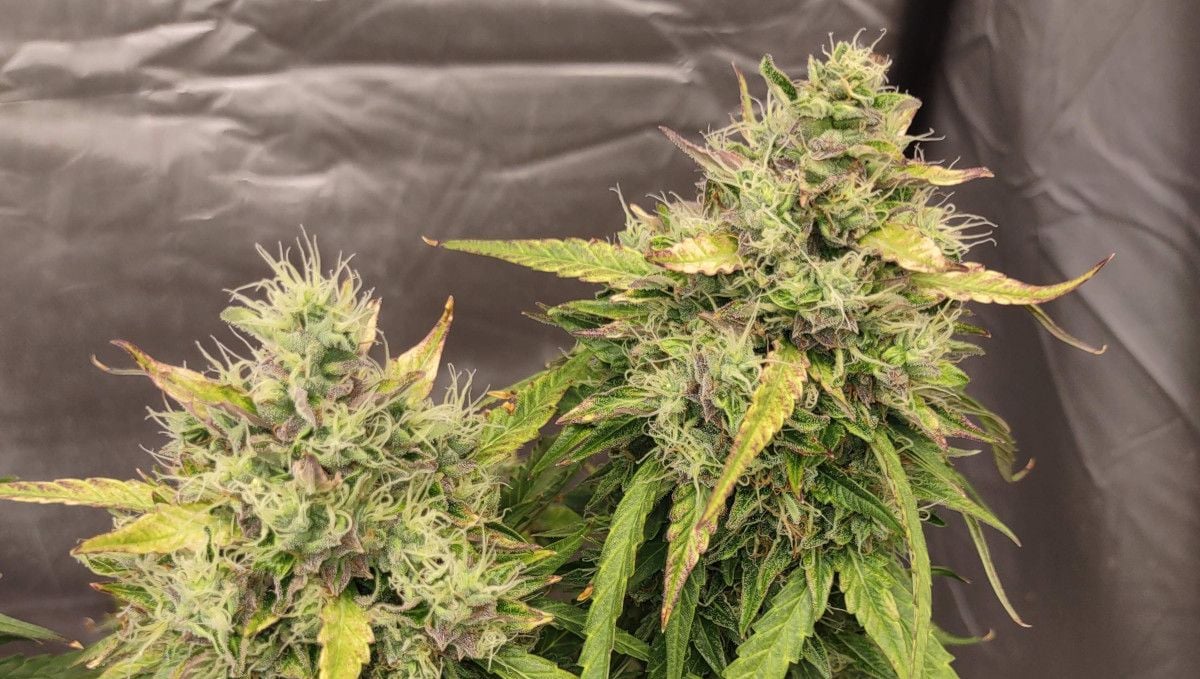
When you see that fan leaves and even 'sugar' leaves start to turn yellow, even in the top part of the plant, and the pistils (the small white hairs) are drying out and turning brown or orange, take a 60x jeweler's loupe and look at the surface of the calyces. The fully mature trichomes are cloudy, as opposed to clear, immature ones. Cloudy means the THC in those trichome heads is at the peak of its concentration. If you miss this perfect moment, it will start to degrade, and the trichs will begin to turn amber

Just keep in mind one more thing: you can't just decide that it's time to chop and do it on the same day without flushing first. Flushing simply means giving your plant nothing but plain water. Sometimes extra amounts of it (with lots of runoff), but normal amounts will do just fine too. When you flush, you clean the buds of built-up minerals and improve the taste of the future smoke.
In soil grows, proper flushing should take up to two weeks, so do your best to calculate the timing in such a way that when the trichs are at their peak, the plant has already been fully cleansed.
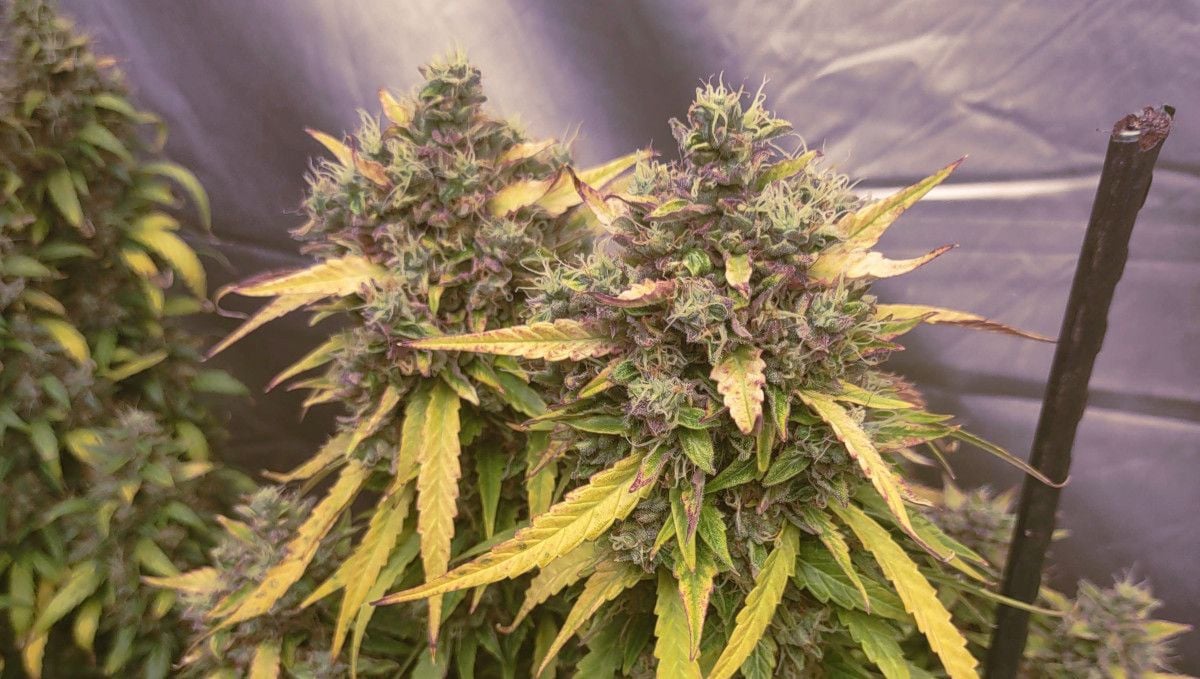
Another way to improve the taste involves the post-harvest treatment of your flowers. Slowly dry them for 5-10 days in a cool, dark room, then snip off the buds from the branches and cure them for another 2-3 weeks in glass jars, not forgetting to open them twice a day to let out the excess moisture. This will cure out the nasty taste of hay and bring out the precious terpenes, making the smoke worthy of your delicious Guava genetics.
10. Smoke And Terpene Profile
Sadly, we’ve found no smoke reports for Frosted Guava Auto, so for the description of its flavor and effects, we have to rely on the breeder’s word. They describe a smoke as exuding an aura of relaxation and euphoria, inviting you to embrace its dreamy and tranquil effects. The name promises both a delightful taste and a high THC content, so expect a fruity punch that will send you flying and leave you yearning for more.
11. In Conclusion
There's not much information to rely on, but from what we've seen so far, Frosted Guava Auto is a compact autoflower that won't require high-stress training to keep its height manageable. No-training or LST will probably be enough in most cases.
The importance of the right conditions is as valid as for any other strain, but in the only grow for which we have data, the temperatures were subpar, but the plant persevered. This could mean that it's heat-resistant enough.
We saw at least a few pictures where the plant looked overwatered, but avoiding overwatering is a standard good practice and not just in the case of Frosted Guava. On the other hand, it seems like a common thing that this autoflower shoots out new immature-looking pistils almost to the end, making it even a less reliable sign of maturity than usual.
In all other respects, Frosted Guava Auto seems like an easy-to-grow, low-maintenance cultivar, so even beginners won't find it hard to cultivate it. Happy growing, everyone, and may you all have generous yields!









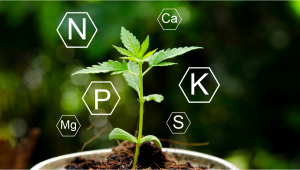


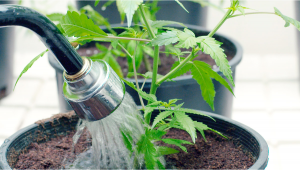


Comments